

File photo: Moneycontrol
Dhaka, Bangladesh (BBN) - The World Bank (WB) has approved $560 million for two projects in Bangladesh to improve reliable power supply and help microenterprises become environmentally sustainable.
The $450 million Enhancement and Strengthening of Power Transmission Network in Eastern Region Project will expand the electricity transmission network in the eastern region, covering the greater Comilla and Noakhali and part of the greater Chittagong, the WB said in a statement, issued from Washington on Thursday.
It will provide new electricity connections to 275,000 households and 16,000 agricultural consumers and reduce power interruptions, according to the statement.
“The project will expand the existing grid network by building 13 new substations and rehabilitating an existing one,” the WB explained.
It will also construct 290 kilometer new and rehabilitate 157 kilometer existing transmission lines, the statement added.
The $110 million Sustainable Enterprise Project (SEP), also approved on the same day, will help 20,000 microenterprises adopt environmentally-friendly practices.
The WB also said it covers manufacturing and agribusiness sectors, including leather, mini textiles, light engineering, plastic, food processing, metal products, livestock, horticulture, aquaculture, and poultry.
The project will incentivize microenterprise clusters to use cleaner technologies and joint amenities such as shared recycling or storage facilities.
“It will provide loans to microenterprises for innovative, environmental-friendly technologies and practices. About 30 per cent of the firms that will benefit are owned by female entrepreneurs,” the WB noted.
The credits are from the International Development Association (IDA), the WB’s concessional lending arm. The Power Transmission Project will receive a scale-up facility credit from IDA, which has a 35-years maturity including a four-year grace period.
On the other hand, the SEP will receive interest-free IDA credit, which is repayable in 38 years, including a six-year grace period, and carry a service charge of 0.75 per cent.
“The World Bank is helping Bangladesh overcome barriers to higher growth. Unreliable power supply and environmentally-unstainable enterprises hinder a county’s competitiveness and poverty reduction efforts,” said Zahid Hussain, World Bank Acting Country Director for Bangladesh.
“By improving electricity transmission and helping in micro-enterprises adopt environment-friendly technologies, these projects will help Bangladesh achieve sustainable growth and advance towards upper middle-income country vision.”
The WB was among the first development partners to support Bangladesh following its independence. Since then the WB has committed nearly $28 billion grants and interest-free credits to Bangladesh.
BBN/SSR/AD